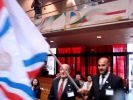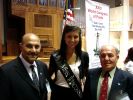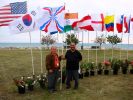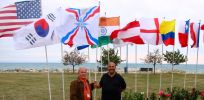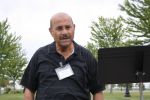Ninos Aho | The Great Assyrian PoetPosted: Sunday, March 04, 2012 at 06:12 AM UTC | Updated: November 24, 2016.
ContentsBiographyNinos Aho (Syriac: ܢܝܢܘܣ ܐܚܘ) (April 24, 1945 – July 15, 2013), was an Assyrian poet and activist. He was born to a Syriac Orthodox family in the small village of Gerkeh-Shamo in Syria. He moved to Qamishli and later to Damascus in order to continue his studies. In 1971, Aho emigrated to the United States. After residing in the United States for twenty years, Malfono Ninos returned to Syria with his wife, Ogareet, and their four children in order to authentically promote his belief in the Assyrian cause. In 2001, Aho and his family returned to the United States when Aho was diagnosed with Non-Hodgkin's Lymphoma, he died due to complications in July 15, 2013 in San Pedro, Los Angeles.[1]
Aho was involved in Assyrian nationalist activism at an early age. He joined the Assyrian Democratic Organization in 1961 during an underground assembly. In order to circumvent official crackdown on non-Arab nationalist sentiments he utilized his poems to be recited by local Syriac Orthodox church choirs in order to reach the public.[2] He gained wider popularity after emigrating to the United States and his poems were performed by prominent Middle Eastern musicians such as Ninib A. Lahdo and Wadi al-Safi.[3] Most of his poems like ''Grain of wheat (ܚܒܬܐ ܕܚܢܛܐ, Ḥabṯo D'Ḥeṭo) were written in Western Syriac vernacular, while others like New Assyrian (ܐܬܘܪܝܐ ܚܕܬܐ, Āturāyā Khātā) in the eastern vernacular.[4] — Wikipedia, September 27, 2013. The Ninos Aho Assyrian Poetry FundThe 4th Endowment Fund at Harvard University The Assyrian language poetry has served the community as a means of honoring the past, examining the present, and imagining the future. Whether in times of pleasure and plenty or in times of want and persecution, Assyrians have written poetry that is preserved in stone and clay, parchment and paper, audio tape and video cassette. Assyrian poetry, as no other medium, from the epic of Gilgamish to the melodious songs of William Daniel, to the love ballad of the young man, has helped to keep the vernacular and the classic Syriac on the living tongue. Driven into Diaspora, the Assyrian nation can aspire to honor its poets in the ways available to a stateless nation: but in the words of a by-gone poet, “A mere flower to the writer in his lifetime is far more rewarding than thousands of wreaths placed on his grave after death.” “A mere flower to the writer in his lifetime is far more rewarding than thousands of wreaths placed on his grave after death.” In the spirit of Naoum Faik who spoke those words, this fund has been initiated by Mr. & Mrs. Elias Hanna of Worcester, Ma. Mr. Hanna wishes to honor his teacher, Ninos Aho, a living Assyrian poet who composes in all three forms of our language - Classical Syriac, vernacular Eastern Syriac and vernacular Western Syriac. The Assyrian community joins the Elias Hanna family in honoring this poet in his lifetime. Ninos Aho, a son of Tur Abdin, raised in Qamishli, Syria, symbolizes the indefatigable spirit of the Assyrian nation: a man of learning, perseverance and strength of belief in his people. He is a man of strong words who achieves his goals. For these qualities the Assyrian community honors him. And through him the Assyrian community wishes to honor all Assyrian poets, composers, singers and writers by having their works collected and preserved as part of Harvard University's rich collection of materials about Assyrian culture, history, art. You can help in two ways:
Ninos Aho Assyrian Poetry Fund
|
|
Atouraya Khata |
The New Assyrian |
| M’libbid noura | From the heart of fire |
| M’umqeh d’umqa | From the depths of eternity |
| M’khutet qaya m’ilpapa d’Toura | From under the rocks to the peak of the mountain |
| Min hehmizman d’aywekh shmayya | From the words of the clouds in the heavens |
| Atouraya Khata breeleh | A New Assyrian is born |
| Min yiqrutha d’alpeh d’shinneh | From the burden of thousands of years |
| M’kipna w sahwa w sneeqootha | From hunger and thirst and destitution |
| M’dugleh d’tareekh | From the lies of history |
| Min taggareh d’neesha w omtha, idyum priqleh | From the merchants of goals and nation, today he is free |
| Qa salbaneh d’haquyatheh | For the deniers of rights |
| Qa zalmaneh d’kul omwatheh | For the oppressors of nations |
| Shlamou ileh golla w bomba | His greeting is a bullet and a bomb |
| Qa sarwaneh zoda itleh | And for those who forsake him, he has more |
| In buqerokh bnay eekehwit, min dim pathe’t dehdi omra’t | If you ask him where he is from, or to which church he belongs |
| Bitjoweblokh b’sharirootha | He will answer you honestly, |
| “La Tyaraya w la Tkhomnaya, | “I am not Tyaraya and not Tkhomnaya, |
| La bnay dashta w la bnay Toura, | I am not a son of the valleys nor a son of the mountains, |
| Yaqubaya w Kaldanaya w Nasturnaya w Presbitrayaobzi l’ewin” | A Jacobite, a Chaldean, a Nestorian and a Presbyterian also I am not” |
| W b’qala rama b’tamir qatokh “Akhchi ewin Atouraya” | And with a firm voice he will tell you, “I am an Assyrian” |
| Dakh bit khayeh, mu bit lawish, eeka b’mayith hich lehtakhmin | He does not care how he lives, what he wears, and where he dies |
| Qad bar minnu b’tatheh jwanqeh | And following in his footsteps, a new armed generation |
| B’Tehnee chakkeh b’tamri shrara | Will come and speak the truth. |
| Libbu b’eedu w ktawu minnu | With his heart on his sleeve and his book always with him |
| B’khdareleh w m’akruzeleh B’kyan Atour, b’eethu d’Atour |
He tours, preaching the nature and existence of Assyria |
| B’khela w dimma, b’shimma d’Ashour… w b’imareleh | By force and by blood, and in the name of Ashur, he declares, |
| “Ana? Ana biryin min qam d’barya ayya araa w aha shimsha | “Me? I was born before the earth and the sun |
| Ana wiyin min qam zona; l’itli mota, l’itli ramsha | I existed before time; there is no death for me, nor end |
| Ana ewin kikhwa d’Atour gu Bet Nahren balbusewin | I am Assyria’s star, shining in the sky between the two rivers |
| Ana ewin Alaha Ashur gighla d’doreh makhdurewin |
I am the god Ashur, I turn the wheel of time |
| Ana wiyin shraya d’bahra l’alma d’tiwel manhurewin | I was the torch of light guiding the people of the world, |
| Mijid idyum ana littin, neekha b’neekha bitlaqewin? | Is it true that today I do not exist and I am slowly vanishing? |
| La w alpayeh d’la! | No and one thousand no’s! |
| Atour pesha w zona b’shatiq | Assyria endures and time will be silenced |
| Atour pesha w tareekh b’saghid | Assyria endures and history will bow |
| Atour pesha w burja b’yasiq | Assyria endures and its tower will rise |
| Atour pesha w hich leh napla” | Assyria endures and will never fall” |
|
|
Nino’s poem, Atouraya Khata [The New Assyrian] was translated into English by Ninos and Zalgai Aho. |
Photos: The 2011 XXXI World Congress of Poets, Kenosha, Wisconsin, USA
 XXXI World Congress of Poets – USA
XXXI World Congress of Poets – USA
 Editors' Note: These additional photographs courtesy of Dr. Dariusz Pacak, a poet friend from Vienna Austria to Ninos Aho, Yosip bet Yosip and the Assyrian community. Both Ninos and Yosip had "Occupied Assyria" symbolically written on their name badges, placed right on their hearts.
Editors' Note: These additional photographs courtesy of Dr. Dariusz Pacak, a poet friend from Vienna Austria to Ninos Aho, Yosip bet Yosip and the Assyrian community. Both Ninos and Yosip had "Occupied Assyria" symbolically written on their name badges, placed right on their hearts.Editors' Note: These photographs courtesy of Alexandru Cetateanu.
AKANT Literary Magazine, No. 12, December 2013
In honor of Ninos Aho by Dr. Dariusz Pacak (in Polish)
AKANT is a Polish-language literary magazine published monthly in Bydgoszcz, Poland.
 Dr. Dariusz Pacak, a poet friend from Vienna Austria to Ninos Aho, Yosip bet Yosip and the Assyrian community, published his endearing message to Ninos Aho.
Dr. Dariusz Pacak, a poet friend from Vienna Austria to Ninos Aho, Yosip bet Yosip and the Assyrian community, published his endearing message to Ninos Aho.
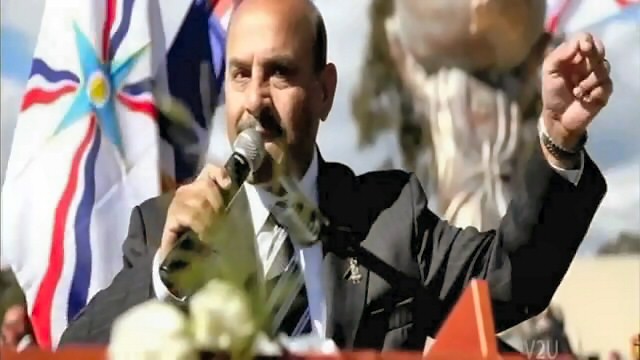
 Ninos Aho
Ninos Aho

